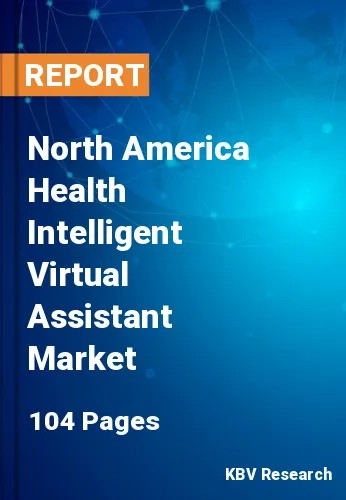The North America Health Intelligent Virtual Assistant Market would witness market growth of 22.5% CAGR during the forecast period (2023-2030).
The COVID-19 pandemic accelerated the adoption of telehealth services, with IVAs being an integral part of remote healthcare delivery. Their role in telehealth is expected to continue growing. IVAs are becoming more sophisticated in their ability to provide personalized health recommendations and interact in a conversational and empathetic manner. Seamless integration with EHR systems allows IVAs to access patient records, improving the accuracy of recommendations and patient care. Voice-controlled IVAs, integrated with smart speakers and wearables, are becoming increasingly popular for hands-free interaction with health information and services. IVAs focusing on offering resources and assistance for mental health have emerged due to the increased emphasis on mental health and wellness. As IVAs handle sensitive healthcare data, ensuring robust data privacy and security measures is a critical trend in the market.
In addition, advanced IVAs use machine learning and AI algorithms to assist healthcare professionals in diagnosing diseases and planning treatments by analyzing patient data. IVAs are now equipped to monitor and analyze behavioral patterns, allowing for early detection of mental health issues and intervention. Some IVAs are exploring blockchain technology to enhance the security and privacy of healthcare data, giving patients greater control over their health information. In surgery, IVAs are used for remote support, providing real-time guidance to surgeons during procedures. IVAs are becoming more versatile by adapting to different languages and cultural nuances, making healthcare services accessible to a broader range of populations.
The United States has one of the world's highest healthcare spending levels per capita. Factors contributing to high healthcare spending include the cost of medical procedures, pharmaceuticals, and administrative expenses. While the United States relies on both public and private healthcare finance, Canada has a publicly supported healthcare system. As per the data given by the United States Centers for Medicare and Medicaid Services, healthcare spending in the United States rose 2.7% in 2021, amounting to $4.3 trillion, or $12,914 per person. Spending on healthcare accounted for 18.3 percent of the country's GDP. Medicare expenditures increased by 8.4% to $900.8 billion in 2021, or 21% of all National Health Expenditure (NHE). Spending on Medicaid increased by 9.2% to $734.0 billion in 2021, or 17% of all NHE.
The US market dominated the North America Health Intelligent Virtual Assistant Market by Country in 2022 and would continue to be a dominant market till 2030; thereby, achieving a market value of $593.4 Million by 2030. The Canada market is expected to witness a CAGR of 25.2% during (2023 - 2030). Additionally, The Mexico market would experience a CAGR of 24.2% during (2023 - 2030).
Based on Product, the market is segmented into Chatbot and Smart Speakers. Based on Technology, the market is segmented into Text to Speech, Text Based and Automatic Speech Recognition. Based on End User, the market is segmented into Payer, Providers and Others. Based on countries, the market is segmented into U.S., Mexico, Canada, and Rest of North America.
Free Valuable Insights: The Health Intelligent Virtual Assistant Market is Predict to reach $2.2 Billion by 2030, at a CAGR of 23.3%
The market research report covers the analysis of key stake holders of the market. Key companies profiled in the report include eGain Corporation, Microsoft Corporation, MedRespond, Next IT Solutions Inc., True Image Interactive, Inc., Virgin Pulse, Inc., Verint Systems, Inc., Babylon Holdings Limited, Amazon.com, Inc., and Sensely, Inc.
By Product
By Technology
By End-user
By Country
Our team of dedicated experts can provide you with attractive expansion opportunities for your business.

